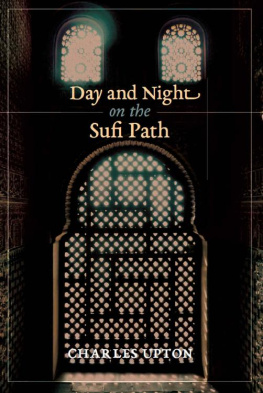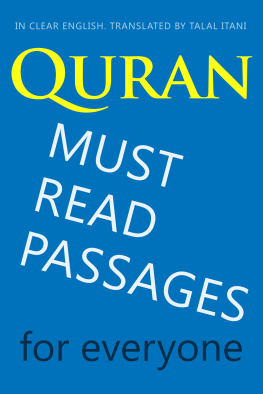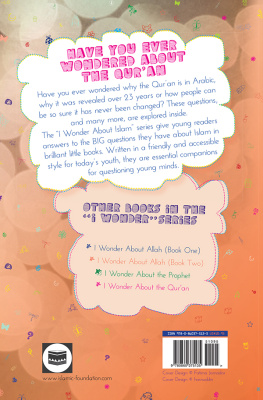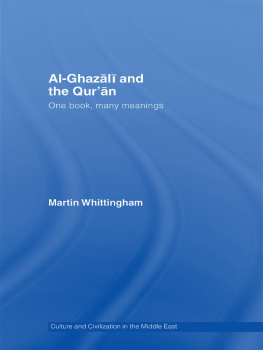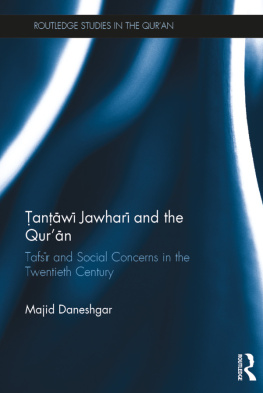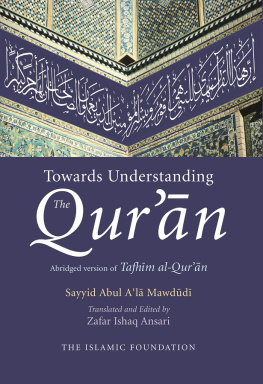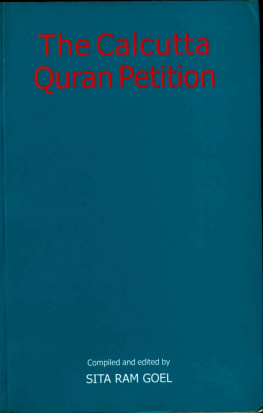Day and Night
On the Sufi Path
Charles Upton
DAY AND NIGHT
On the Sufi Path


First published in the USA
by Sophia Perennis, 2015
An imprint of Angelico Press
Charles Upton 2015
All rights reserved
Series editor: James R. Wetmore
No part of this book may be reproduced or transmitted,
in any form or by any means, without permission
For information, address:
Angelico Press
4709 Briar Knoll Dr.
Kettering, OH 45429
angelicopress.com
pbk: 978-1-62138-135-8
ebook: 978-1-62138-136-5
Cover image: Doorway in Hall of Ambassadors, Alhambra
Cover design: Michael Schrauzer
CONTENTS
It is He who taketh your souls at night, and knoweth what you have merited in the day. [Q. 6:60/6:60]
Every day doth some new work employ Him. [Q. 55:29/55:29]
If you want to be counted among the people of insight
You must pass from statement to state.
You cant become a unitarian simply by reciting the Surah of Unity
Any more than you can sweeten your mouth just by saying the word sugar.
Jami
Praise the name of thy Lord The Most High, Who hath created and balanced all things. [Q. 87:12/87:12]
By a Soul and Him who balanced it [Q. 91:7/91:7]

Despite the growing number of academic books on Sufism, original treatises in English are quite rare. When they do appear, they compel us to acknowledge that Sufism is still a living tradition best explained from within. In Day and Night on the Sufi Path Charles Upton provides us with a lucid glimpse of one of the spiritual paths to God in Islam. Classical Sufi teachings on the soul, spiritual practice, states and stations, and potential dangers are discussed with eloquence and rigor in a manner that is true to the tradition and relevant to the time we are in. This work is at once philosophical and poetic, systematic and with flashes of original inspiration that can only come from someone conversant in both the theoretical and practical dimensions of tasawwuf. It is a faithful reflection of the Divine Light that has captured the authors attention and may help to illuminate the path for others.
In a manner that is reminiscent of Ibn al-Arabi, the vision articulated here is receptive to the diversity of Divine disclosures while not being exclusively bound by any single one. Through the recognition of God in each moment we open ourselves to the movement of His signs in the cosmos and the soul, and in that which transcends them.
Zachary Markwith, author of One God,
Many Prophets: The Universal Wisdom of Islam
Introduction
T he S ufis say that you cant get Sufism from booksand yet they keep on writing books. How can we explain this apparent paradox? Books on Tasawwuf, if they are true and accurate, may at the very least prevent the growth of certain errors and misconceptions. Beyond that, they have the potentialGod willingof attracting to Sufism some of those who are destined by Allah to embrace the Path as a concrete reality, not just a mental image.
I am not a shaykh; I am not a public Sufi who runs workshops; speaking as precisely as I can, I am someone with a facility for expressing metaphysical ideas and with some insight into spiritual psychology who has been on the Sufi path for the past quarter century. I pray that my presentation of Tasawwuf will not be so gross as to obscure the truth of my subject, or so subtle as to counterfeit that truth, diverting the reader from Divine Reality by the very expression of it, in view of the fact that the closer we come to the Real, the more destructive any error or illusion becomes. Those who study the words and follow the prescriptions of the shaykhs may know something, but their words are without authority, except whatever momentary authority Allah may grant them out of His generosity, often without their ever being aware of it. The words of the shaykhs, however, are spoken out of His realized and established authority. The most subtle esoteric philosophy, in the absence of this authority, is of no more than academic interest, while what may seem to be a mere moral platitude, when spoken by a true shaykh, carries the power of its own realization, deeper than words, deeper even than silence. Many call themselves shaykhs who are not so in reality, but if Allah has destined you to encounter a true shaykh then you will meet him without fail; may Allah also grant you the power to recognize him, and follow his guidance.
Metaphysical knowledge is knowledge of eternal, changeless Principles. However, if one attains such knowledge and also identifies with it on the basis of a subtle possessiveness, spiritual transformation becomes impossible; because one sees oneself as already there, one cannot take even the first real step on the spiritual Path. What to the Heart is the Spirit of Allah, the vibratory Self-manifesting radiance of eternal Truth, to the Nafs al-ammara bil su, the self commanding to evil or largely unconscious ego, is only stagnation and paralysis. The cure for this illness, if one has been unfortunate enough to contract it, is to shift ones attention from what one knows of Allah to the truth that one is known by Him, known more intimately and more completely than one could ever know either Allah or oneself. The object of this Knowledge, this Marifah, is the human form; the Knowledge itself belongs to Allah, and is Allah.
One of the central subjects of this book is what are called in Sufism the ahwal or spiritual states. A danger in writing about such states is that people might think of them as interesting and hope to try them outinstead of fulfilling their spiritual duties, putting themselves in the hands of Allah, making His wishes theirs, and wanting nothing but Him. But since states will likely occur in the course of the spiritual Path, it is advisable to have a sufficiently accurate and useful theory of them, otherwise they may be unnecessarily puzzling, disorienting, frightening, distracting, or enticing. (Even a perceived lack of states may, from one perspective, be considered as a state or station in itselfthe station of Stability, let us say, or that of Sobriety.) States arrive when the Presence of Allah encounters subjective psychic barriers that need to be dissolved. A river that flows deeply and without obstructions may be so silent and so free of turbulence that it appears motionlessthough anyone who enters it will certainly learn its power. A relatively shallow river, however, one that is filled with stones and sand bars and fallen logs, will exhibit many interesting patterns of turbulence, and make a lot of noise. But such a river is navigable only with difficulty. Over time, however, the force of the water may clear the obstructions, wear down the rocks, and sufficiently deepen the channel so that it becomes useful for purposes of travel, capable of swiftly and easily transporting many passengers. In my own case, I was blessed, or cursed, with what is called the artistic temperament, indicating a degree of psychic volatility that, while useful for some things, also presents many problems; one of my goals in writing this book has been to better understand, and learn to more skillfully deal with, qualities and tendencies that otherwise might have wasted my capacity and damaged my spiritual life.
Next page
